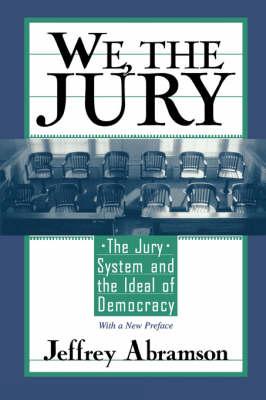Full Product Details
Author: Jeffrey Abramson
Publisher: Harvard University Press
Imprint: Harvard University Press
Dimensions:
Width: 15.60cm
, Height: 2.80cm
, Length: 23.50cm
Weight: 0.408kg
ISBN: 9780674004306
ISBN 10: 0674004302
Pages: 350
Publication Date: 15 November 2000
Audience:
College/higher education
,
Undergraduate
,
Postgraduate, Research & Scholarly
Format: Paperback
Publisher's Status: Active
Availability: Out of stock

The supplier is temporarily out of stock of this item. It will be ordered for you on backorder and shipped when it becomes available.
Reviews
Anyone tempted to ridicule juries...should read Jeffrey Abramson's profound and eloquent defense of the American jury system...Mr. Abramson has faith in juries because they are a form of democratic justice. He describes in fascinating detail how democracy in America has developed over the years in tandem with the jury system. The Economist Power to the persuasive! That's the message of Jeffrey Abramson's incisive, thoroughly researched, demanding book about the role of the jury in American democracy... At a rare moment when the media have whetted the public appetite for commentary about the jury, of all things, a fresh, substantial [book] has come along. Washington Post Book World
Power to the persuasive! That's the message of Jeffrey Abramson's incisive, thoroughly researched, demanding book about the role of the jury in American democracy... At a rare moment when the media have whetted the public appetite for commentary about the jury, of all things, a fresh, substantial [book] has come along.
Anyone tempted to ridicule juries...should read Jeffrey Abramson's profound and eloquent defense of the American jury system...Mr. Abramson has faith in juries because they are a form of democratic justice. He describes in fascinating detail how democracy in America has developed over the years in tandem with the jury system. The Economist Power to the persuasive! That's the message of Jeffrey Abramson's incisive, thoroughly researched, demanding book about the role of the jury in American democracy... At a rare moment when the media have whetted the public appetite for commentary about the jury, of all things, a fresh, substantial [book] has come along. Washington Post Book World
An eloquent and persuasive study of how the American jury system has degenerated since colonial times and what can be done to restore it. Jurors are forever smarter than assumed by lawyers working from manuals, writes Abramson (Politics/Brandeis; The Electronic Commonwealth, 1988), and he should know; he was a prosecutor in a DA's office. When he argues, for example, that juries should be empowered to vote their consciences even if that means nullifying the law as the judge explains it to them, he is writing both as a scholar well versed in jury practice at the time of the Founding Fathers and as someone with firsthand exposure to modern juries - a rare combination in a legal historian. Abramson probes the historic debate between Federalists and Anti-Federalists over whether juries should be predominantly local (neighbors who know local customs but are not impartial with respect to the defendant) or predominantly impartial. Over time the impartial jury won out, but he argues that the notion of impartiality has come to mean both empty-minded (witness, he says, the selection of jurors in the trials of Oliver North and the Menendez brothers) and representational, a convocation of society's various subgroups voting according to their inevitable biases. Abramson has nothing against impanelling women or ethnic minorities on juries; on the contrary, he favors the inclusion of subgroups to insure enriched deliberations across group lines. His distaste for mere proportional representation for group differences may strike the reader as a philosophical quibble, but he suggests concrete ways to restore the jury to the 18th-century ideal: impanel well-informed citizens; instruct the jury that they may nullify unjust laws; end all peremptory challenges of jurors based on minority status; insist on unanimous verdicts (which state verdicts do not currently need to be). However, Abramson is also realistic: He knows that juries are incapable of handing down color-blind death sentences and finds that intolerable. Brilliant, accessible scholarship that perfectly complements Stephen J. Adler's recent, anecdotal The Jury (p. 893). (Kirkus Reviews)
Author Information
Jeffrey Abramson is Professor of Government and Law and Fellow of the Frank C. Erwin, Jr. Centennial Chair in Government, The University of Texas at Austin.



